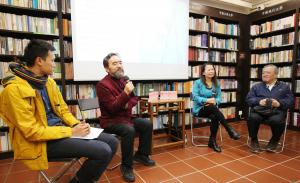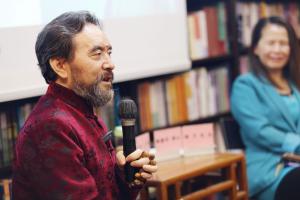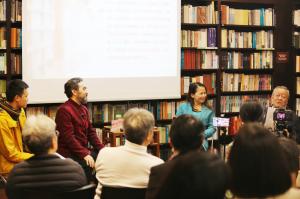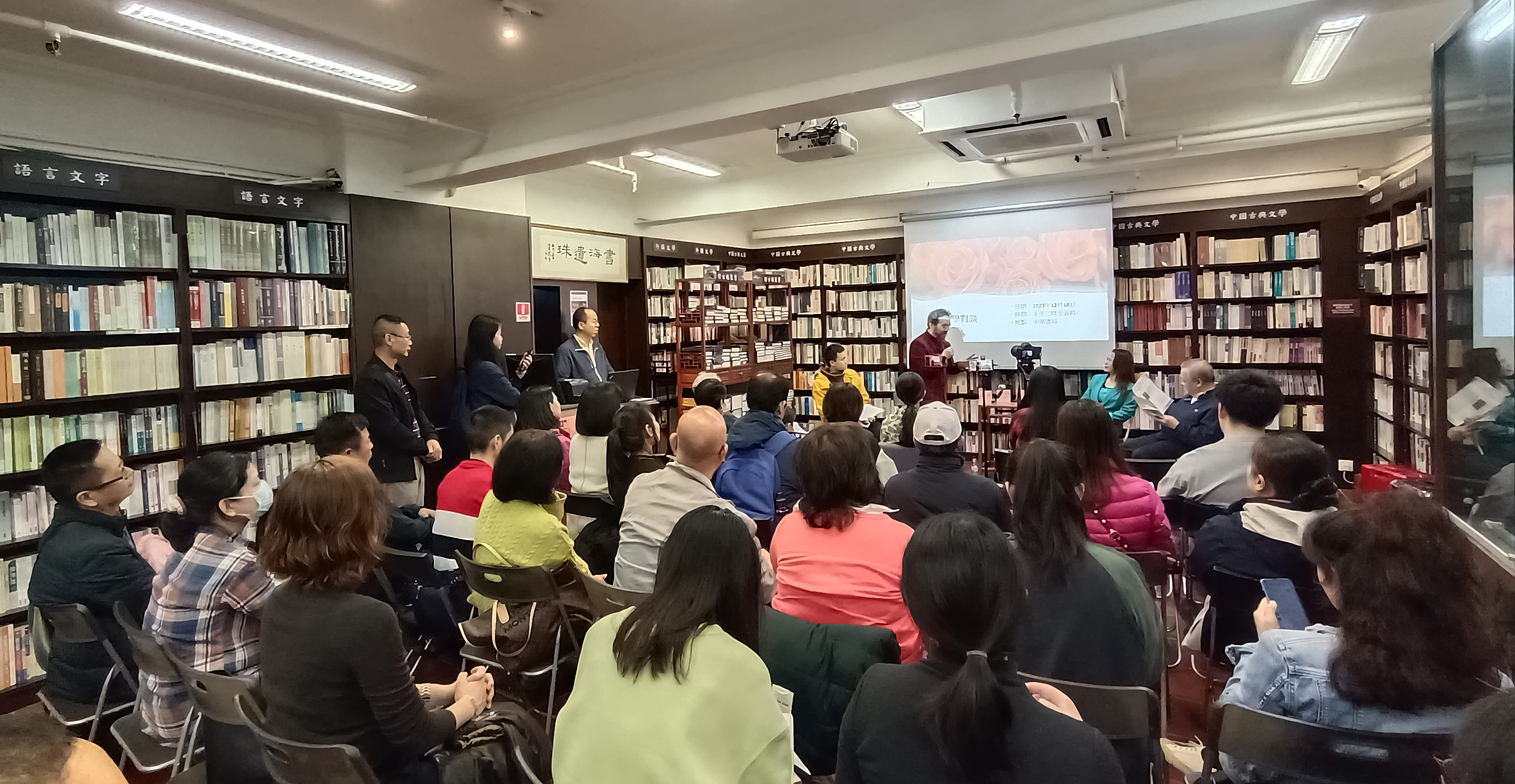Xue Mo on Literature: I Wish to Narrate Stories of Love and Wisdom to the World with a Humble Heart
A true scholar, upon achieving academic success, should break all boundaries, allowing wisdom to flow freely into the world.”
— Xue Mo
CHICAGO, IL, UNITED STATES, December 26, 2023 /EINPresswire.com/ — “As a down-to-earth writer, I always observe the world with a humble heart, wishing to capture authentic stories amid the hustle and bustle of everyday life,” declared Xue Mo, a celebrated author hailing from western China. This statement came during a recent reader interaction at Chung Hwa Book Store’s Yau Ma Tei branch in Hong Kong on December 18, 2023. His latest novel, “Qiang Village,” was the focal point of the event.
“Of all my novels, ‘Qiang Village’ might not be the best, but it’s certainly the most unique,” Xue Mo proudly introduced his latest work to the audience. “Though it lacks a central theme, it vividly brings to life an undefinable giant world where each character is intricately crafted and realistic.”
Set in western China, “Qiang Village” revives an ancient stockade, weaving a captivating historical mystery deeply infused with local culture and traditions. The novel masterfully blends bold heroism and tribal conflicts with touching romance, delving deeply into profound themes such as life, justice, and faith.
During the event, author Xue Mo, alongside two guest speakers – Dr. Lai Qingfang, a lecturer at the School of Chinese at HKU, and Dr. Zeng Fanyu, Assistant Professor in the Department of Chinese at HKBU – engaged in a two-hour discussion themed “Exploring the New Facets of Non-traditional Magical Realism through ‘Qiang Village.’” The session was moderated by Mei Zi, a critic and the editor-in-chief of Hong Kong Literature Bimonthly magazine.
After Xue Mo presented his book to the audience, Mei Zi briefly shared his understanding and even appreciation for the absence of a “central theme” in “Qiang Village.” He compared its style to Chinese landscape painting, where reality and abstraction harmoniously coexist, creating a boundless and distant atmosphere. Mei Zi believed this style provides readers with ample space for thought and imagination. He said that truly great works are not only easy to grasp but also continuously thought-provoking, offering fresh insights upon each reading and delivering lifelong benefits to their readers.
Dr. Zeng perceived Xue Mo’s novel as somewhat chaotic and unclear, mirroring the undefined nature of life itself. He contended that the depiction of Qiang Village in the novel transcends a mere historical or geographical setting, representing a broader concept deeply linked to human nature. He argued that merely labeling the novel as magical realism doesn’t fully capture Xue Mo’s extensive study and profound insight into the human psyche. In Zeng’s view, the novel’s deep exploration of humanity is presented through a distinctive narrative approach, where each character signifies different facets of the “self,” encouraging readers to introspect and contemplate life.
Upon learning that “Qiang Village” was revised four to five times before publication, Dr. Lai asked Xue Mo, “As a confident author, why do you revise your work so often?” Xue Mo responded, “The revisions are my quest to find the best way to resonate with readers and make the work more readable. Writing, to me, is like panning for gold – it’s about washing away all the ‘sand’ to leave only the pure ‘gold’. A work is complete only when it reaches this degree of refinement; otherwise, I would not publish it.”
Mei Zi highly praised Xue Mo’s relentless pursuit of linguistic artistry, attributing it to his respect for his readers and his deep reverence for literature. Dr. Zeng also agreed, “For a writer with ambition, frequent revision is key to perfecting their work, honing their ideas and skills in the process.”
“I have devoted my entire life to writing, letting my works voice my mind. Creating something truly distinctive has always been my literary pursuit,” Xue Mo emphasized during the sharing session. His literary works, rich in regional culture and customs, have garnered global attention. He is now a frequent visitor and active speaker at many international book fairs, including the Frankfurt Book Fair. His “Selected Stories by Xue Mo” has been translated into nearly 30 different languages, including French, German, and Spanish. Ever since the release of his devout work “Desert Rites,” Xue Mo has produced more than 100 literary and cultural works over the past four decades.
A doctoral student majoring in Chinese literature summarized three distinct features of Xue Mo’s works: a profound sentiment for local culture, extensive use of dialects and folklore, and insightful reflections on modern human existence. Dr. Zeng, an expert in the field, remarked that these three characteristics mirror the depth, breadth, and modernity of Xue Mo’s writings. His works go beyond mere reflections on the past, delving deeply into the essence of contemporary society and the human condition, exploring themes such as the modern psyche, societal issues, and thoughtful considerations of humanity’s future.
“Compassion for the world and its people forms the undertone of my works, while love and wisdom are the melodies of my life. Pursuing inner joy, and upholding truth, goodness, and beauty as my core beliefs,” stated Xue Mo.
Author Xue Mo elaborated on his creation philosophy, emphasizing that his works are not mere depictions of a specific culture or a particular nation but profound prophecies about our human fate. He cited “Qiang Village” and “Desert Hunters” as examples, both of which explore recurring themes of self-destruction and internal conflict throughout history. These narratives are not only retrospective examinations of history but also serve as critiques of modern society, celebrating love and wisdom, while denouncing violence and bloodshed.
“Everything one gains will eventually be lost; our current existence will turn into the past, and ultimately, we will all vanish from this world. We can’t change this outcome, but what we can change is the state of our existence, our inner happiness.” Xue Mo elicited his personal pursuit. He also identified two cornerstones of inner happiness: love, the good intention and act of sharing one’s possessions and knowledge with others, and wisdom, the art of making the right decisions in life, understanding what to reject and what to persevere in. Xue Mo’s happiness philosophy is indeed evident in each of his literary and cultural works.
Additionally, Xue Mo expressed his concern over humanity’s collective downfall, highlighting how civilization has lost its spiritual essence due to an excessive focus on material desires and individual property rights, often at the expense of collective well-being. He called for a return of the pre-fallen state, noting that China’s western region still preserves the untainted origins of human civilization. His literary works are rooted in the most authentic aspects of eastern culture, infused with contemporary elements to meet the spiritual needs of modern people.
“Today’s world really needs a culture of peace and harmony, and we will try our best to promote love and wisdom via books and creative products.”
“Indeed, through literary works such as ‘Qiang Village,’ Xue Mo deeply probes the truths behind human nature, raising ultimate questions about life’s purpose, the way of living, and the future of humanity. His books, without providing direct answers, provoke deep contemplation among readers and are poised to impact world literature significantly.” Mei Zi responded.
As the conversation progressed, Dr. Lai showed a keen interest in Xue Mo’s personal growth, asking, “From an unknown literary youth to a globally acclaimed author and scholar, have you ever felt lonely along the way?” Xue Mo recalled his early days of writing: “I secluded myself in a room for twenty years, all in pursuit of character refinement.” He admitted to feeling lonely during those years due to the lack of readership.
“In the beginning, solitude is necessary, because it fosters a cognition and artistic taste that surpass the times,” explained Xue Mo. “When someone’s cognition and artistic taste exceed their contemporaries’, loneliness becomes inevitable. Vincent Van Gogh and the poet Li Bai are typical examples of this. But over time, as an author’s cognition and artistic taste begin to resonate with readers, loneliness dissipates. Today, I really cherish my loyal fans, both domestically and internationally. My mornings spent reading with them are my happiest moments. Sharing good culture is vital; the more it is shared, the more joy it brings. Through sharing, individual happiness transforms into a collective celebration.”
Throughout his career, Xue Mo has maintained deep respect and care for his readers. To him, an author’s mission is to build an emotional connection with readers through words, transmitting messages of love and wisdom. This relationship transcends conventional author-reader boundaries, fostering a literary community that shares joy and nurtures growth.
In the Q&A session, a reader asked, “Mr. Xue Mo, can you describe your explosive writing style and how to become a better scholar?”
“Before writing, I immerse myself in extensive reading, embracing diverse thoughts as rivers converge into the sea,” Xue Mo replied. “In those moments, my mind becomes like the ocean, undisturbed by ego. A large stone creates big waves; a small one, gentle ripples. An earthquake triggers a tsunami, and a full moon brings the tides. This boundless mindset frees my writing, whether it’s my cultural works like ‘Xue Mo’s Wisdom Class’ or novels such as ‘Qiang Village.’”
Regarding becoming a better scholar, Mo suggests that scholars should not be limited by rigid rules and paradigms but should present knowledge and wisdom clearly and simply. He referenced Nietzsche’s approach to writing and emphasized the importance of resonating with readers, rather than simply showcasing academic skills and knowledge.
“A true scholar, upon achieving academic success, should break all boundaries, allowing wisdom to flow freely into the world.”
“Hong Kong, a diverse and inclusive city, has sparked my creativity. I feel a deep connection with this dynamic city,” said Xue Mo. He expressed his hope to make Hong Kong his new “landmark” for future inspirations, drawing from its vibrant energy to enrich his future works.
This book sharing session was co-sponsored by Hong Kong Zhonghua International Media Publishing Group and Hong Kong Shangpa Culture Distribution Co., Ltd.
Tips:
Grab a New Book “Curses of the Kingdom of Xixia ” by Xue Mo on Amazon
https://www.amazon.com/Curses-Kingdom-Xixia-Excelsior-Editions-ebook/dp/B0C4G1JMJ1/ref=sr_1_1?crid=PAHT74PXD6AZ&keywords=curses+of+the+kingdom+of+xixia&qid=1703558662&s=audible&sprefix=Curses+of+the+kin%2Caudible%2C103&sr=1-1
Ida
RUXUE INTERNATIONAL MEDIA INC
email us here
Visit us on social media:
Facebook
Twitter
YouTube
Thank you ! Xue Mo
![]()
Originally published at https://www.einpresswire.com/article/677341300/xue-mo-on-literature-i-wish-to-narrate-stories-of-love-and-wisdom-to-the-world-with-a-humble-heart







